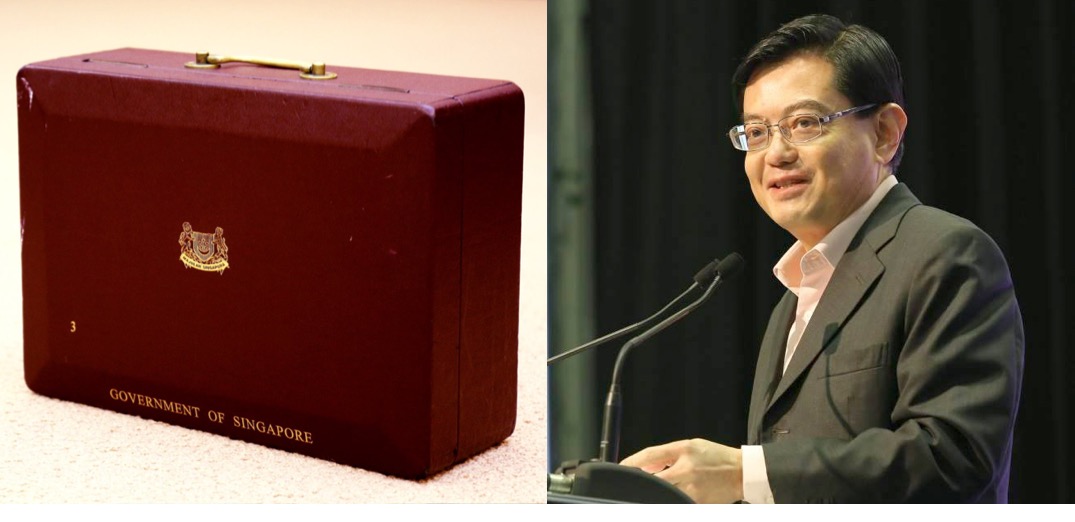On November 23, the People's Action Party (PAP) announced Finance Minister Heng Swee Keat and Trade & Industry Minister Chan Chun Sing as its new first assistant secretary-general and second assistant secretary-general respectively.
Singapore's 4G leadership threw their weight behind two as their leaders, announcing that this decision was a consensus reached after many years of working together.
Heng is now the frontrunner to become Singapore's fourth Prime Minister.
Here's a look at his public service journey:
1983: started in the police force
Heng started his public service journey with the Singapore Police Force (SPF) in 1983 where he quickly climbed the ranks from a police constable to Assistant Commissioner of Police.
One of the things he did in the SPF was to raid construction sites to weed out illegal immigrants.
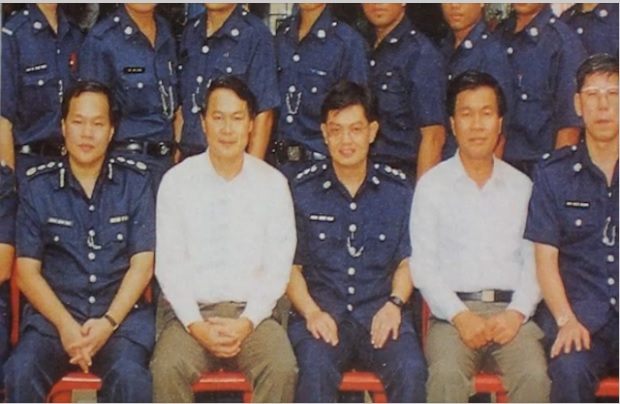 Image via
Image via
1997: Entered civil service, became LKY's PPS
In 1997, Heng joined the civil service. Within the same year, he became the Principal Private Secretary (PPS) to then-Senior Minister Lee Kuan Yew.
And what's a PPS? It's a high-ranking civil servant (as senior as the Deputy Secretary in a Ministry) and runs the Prime Minister or Senior Minister’s private office. This role is similar to others that exist in the British civil service and Australian Public Service.
Other cabinet members who used to be PPS to the current and former Prime Ministers include Education Minister Ong Ye Kung and National Development Minister Lawrence Wong.
Here's a post by Heng detailing some of the work he did as Lee's PPS, much of which revolved around the famous "red box":
In One Man's View of the World, one of his autobiographies, the late Lee had this to say about Heng, who served as his PPS from 1997 to 2000:"Heng Swee Keat... was the best Principal Private Secretary I ever had. The only pity is that he is not of a big bulk, which makes a difference in a mass rally. But he has one of the finest minds among the civil servants I have worked with."
2001: Permanent Secretary at MTI, then central bank chief
From 2001, Heng took on the role of Permanent Secretary at the Ministry of Trade and Industry (MTI) until 2005 when he went on to become the Managing Director of the Monetary Authority of Singapore (MAS).
During his time at MAS, Heng led the country through the financial crisis of 2008 and 2009 — a feat the late Lee credited him for helping Singapore “(recover) faster than other countries”.
2011: Entry to politics & government
Heng's departure from the MAS in 2011 was a clear signal at the time of the larger things planned for him. That year, then-Senior Minister Goh Chok Tong had already sagely said this about him:
"A high flyer and sound central banker, he has the potential to be a minister and core member of fourth generation team."
Sure enough, Heng was fielded in the 2011 General Election in the Tampines Group Representation Constituency (GRC). Just weeks after the election, Heng was appointed as Minister for Education.
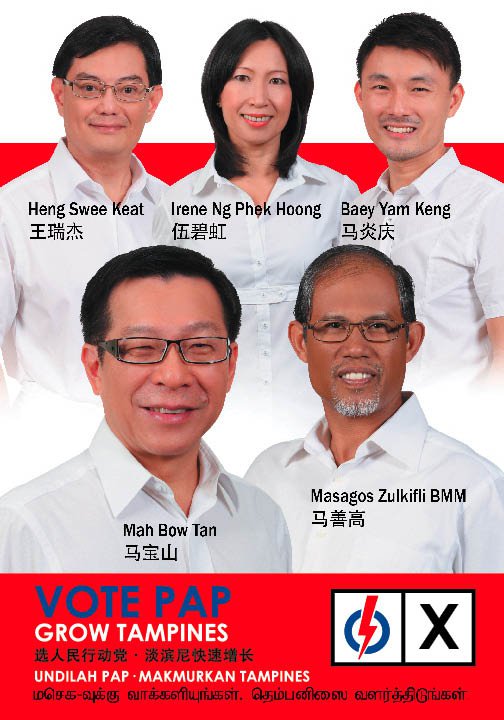 PAP's Tampines GRC poster during the 2011 General Election. Via Heng's Facebook page.
PAP's Tampines GRC poster during the 2011 General Election. Via Heng's Facebook page.
Also 2011: Education Minister & "Every school a good school"
You might remember Heng's education tenure for his 2012 catchphrase — "Every school a good school". There was an uproar when Singaporeans took his words to mean that every school is equal in terms of standards, but Heng later clarified in Parliament:
“Every school a good school does not mean every school the same school. But it does mean every school a good school in its own way, seeking to bring out the best in every child.”
Heng drove programmes that were student-centric and emphasised the holistic development of students across various pathways.
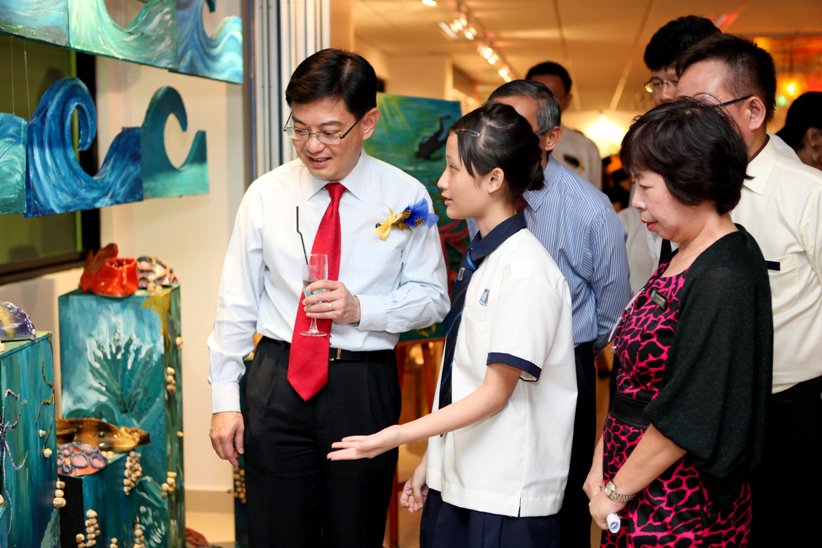 Heng as Education Minister. Via Heng's Facebook page.
Heng as Education Minister. Via Heng's Facebook page.
2012-3: Our Singapore Conversation
During his time as Education Minister, Heng also led "Our Singapore Conversation" — a national initiative that reached out to more than 50,000 Singaporeans for their aspirations for Singapore's future.
The first session held under this effort was in October 2012, after PM Lee announced it in his National Day Rally that year, and involved 60 participants. The government would go on to have 660 of these sessions that involved more than 47,000 Singaporeans of all walks of life and in multiple languages, through July 2013, in Singapore as well as overseas.
Reflecting on the experience in a report the government released after it was all over, Heng wrote:
"All around us, I see the world growing more complex, with challenges coming fast and furious, and our needs growing ever more diverse. How, in such a world, can any one group of people have the answers to everything?
If we are to work together towards a future Singapore that stirs our passion and pride, we must get everyone involved."
2014-5: Heading up SG50
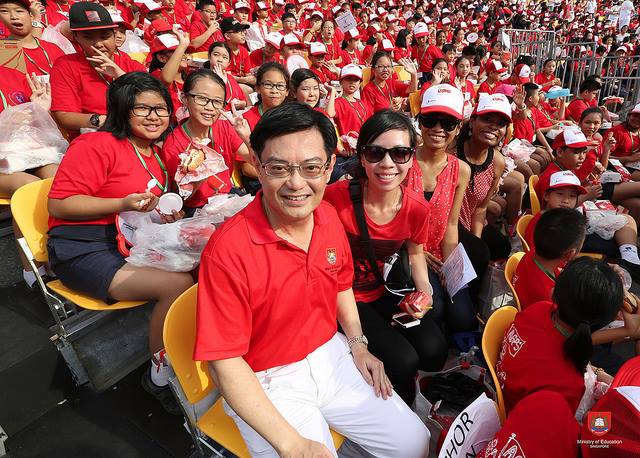
Heng also led the SG50 Steering Committee to celebrate Singapore's 50th anniversary.
On top of hundreds of large-scale projects initiated by Heng's 30-member committee, S$10 million was also ploughed into some 400 ground-up activities to commemorate SG50.
During that time, he also introduced a series of discussion sessions called "SGfuture", led by Ministers Grace Fu and Chan Chun Sing.
Between Nov. 2015 and July 2016, 121 dialogue sessions were held with more than 8,300 Singaporeans, according to SGfuture's report.
These initiatives cemented Heng's consultative style — one that he brings to his new role as PAP's first assistant secretary-general.
At the latest press conference he helmed with Chan, Heng said:
"I am very open," he said, "I listen to all views and I decide what needs to be done."
Also 2015: Becoming Finance Minister
In 2015, Heng took on the Finance portfolio. Since then, he has delivered three Budget speeches, most notably, the recent 2018 one where he announced the 2 per cent GST increase.
His time as Finance Minister was briefly marred by a sudden stroke in May 2016.
He made quite a stunning recovery, though, getting discharged just six weeks later — given that it was a brain aneurysm that triggered it:
His downtime helped all of us realise how weighty his workload was too:
Heng resumed his Finance Ministry duties in August 2016 with great fervour.
With his new appointment in the PAP, Heng is now set to become Singapore's fourth Prime Minister, and judging from his extensive public service and political experience, he certainly looks qualified for the job.
Top images via Heng Swee Keat's Facebook page.
If you like what you read, follow us on Facebook, Instagram, Twitter and Telegram to get the latest updates.
